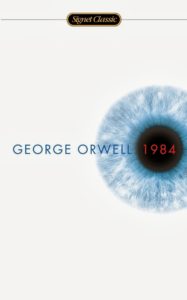Review: 1984

1984 is probably the best-written book I’ve pulled from the shelf to date. That there’s an absorbing and urgent narrative here as well is icing on the Orwellian cake. The lessons of Oceania transcend era and have lasting value for those working to organize and uplift society.
It’s as if Orwell has reached into the future and touched the mood of the present. One can connect with ease Orwell’s cautionary dystopia to the depredations of American privacy that have surfaced in just the last couple of years. Much of 1984’s quirky “Newspeak” — terms like thoughtcrime, doublethink, and Big Brother — have been absorbed into the modern idiom. Among the rarefied collective of the greatest writers the English language has ever known, George Orwell painstakingly crafted a penetrating, prophetic tale, a world within a world, a spiraling ideascape whose tendrils integrate seamlessly with the realities of modern life.
Here’s a small collation of the winged brilliance flanking the reader at every turn:
Recommended companion reading:
—Brave New World by Aldous Huxley (1932)
—Amusing Ourselves to Death: Public Discourse in the Age of Show Business by Neil Postman (1985)
Note: This review is mirrored over at Goodreads and at Amazon.



Comments